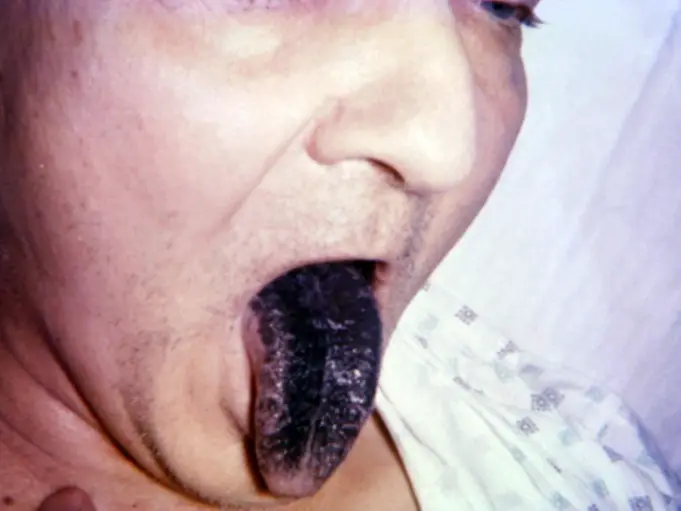Although a scary thing to see, having a black tongue is not a sign of anything life-threatening. Even when you feel what you have on your tongue feels hairy, it helps not to panic, as these aren’t hair.
These conditions are referred to as “black, hairy tongue,” and they are temporary.
Causes
The tongue is layered with hundreds of small bumps known as papillae. Naturally, we don’t notice these bumps, but when dead skin cells gather on the tip, they start to appear longer.
These extended papillae can get stained by bacteria and other things easily, giving your tongue it’s furry and black appearance. Medical experts have not been able to explain why the tongue sometimes stop shedding dead skin cells; nonetheless, it may be linked with the following:
- Low production of saliva: The production of saliva helps us to ingest dead skin cells. This becomes impossible when the production of saliva becomes very minimal, causing dead skin cells to stay in the tongue.
- Poor oral hygiene: When the tongue is not teeth and tongue aren’t cleaned regularly, it’s highly likely that dead skin cells would gather on the tongue.
- Side effects of medication: Specific medications have side effects that include dry mouth. This can cause the saliva to dry up, hence accumulating dead skin cells on the tongue.
- Liquid diet: Dead skin cells are scraped off our tongue when we eat solid foods. This becomes impossible when a person maintains a liquid diet.
Why is it black?
Bacteria and other products can get trapped when there is a buildup of dead skin cells on the tongue. This can cause the tongue to look black or dark brown.
Other factors may include:
- Antibiotics: Antibiotics eliminates both good and bad bacteria in the body. When this happens, it can disrupt the balance of bacteria present in the mouth, which then allows certain bacteria and yeast to thrive.
- Tea or coffee: Drinking too much tea and coffee can easily stain elongated papillae.
- Tobacco: Chewing or smoking tobacco is one of the leading causes of the black tongue. Tobacco can easily stain the extended papillae on the tongue.
- Bismuth sub salicylate: This is quite a common ingredient in some gastrointestinal meds that are gotten over the counter. It can react with sulfur residue in the mouth, causing black stain in the tongue.
- Mouthwash: Some mouthwashes containing oxidizing agents like peroxide can lead to an imbalance in the bacteria present in the mouth.
Treatment
You might want to fix an appointment with your doctor if you suspect the black tongue is a reaction to a medication you’ve been taken or if you are on a liquid diet.
Adjusting your prescriptions would be the next best option to help reduce the stain on your tongue.
Your doctor might also prescribe an antibacterial or antifungal medication to help manage bacterial or yeast infection in your mouth. The administrating of retinoid medication can also be used to maximize cell turnover on the tongue.
Generally, no treatment is required for a black tongue. In most cases, brushing regularly can help to eliminate traces of dead skin cells on the tongue. The stains should clear off within a few days.
For aggressive papillae, your medical doctor can scrape them off with the use of electrodesiccation or carbon dioxide laser burning. This is done to cut and seal the papillae simultaneously.
Nevertheless, the condition can be taken care of using any of the following;
- Brushing regularly: Regularly brushing the tongue twice a day can help to rid off bacteria and dead skin cells.
- Brush after eating: Brushing your tongue and teeth after every meal can help to stop bacteria and food debris from getting stuck in the papillae.
- Use a tongue scraper: the use of a tongue scraper after brushing will help to keep dead skin cells from staining your papillae. A tongue scraper can easily be ordered online.
- Brush after drinking: Brushing after having alcohol, tea, and coffee should help to prevent stains.
- Flossing before bedtime: Flossing at least once every day can stop plaques and debris from forming in the mouth.
- Quit using tobacco products: Stopping the uses of tobacco may be the best thing you can do for your tongue. If you’re finding it hard to quit, ensure to brush your tongue and teeth every time you smoke or chew tobacco.
- Drink plenty of water: Drinking plenty of water would help to hydrate your mouth, which would allow you to swallow dead skin cells that have settled on the tongue.
- Schedule a cleaning: Your dentist should do an excellent job of helping you maintain good oral health.
- Maintain a healthy diet: A complete diet that consists of lean proteins, vegetables, fruits, and whole grains should help to maintain a healthy bacteria balance in the mouth.
Outlook
Having a black tongue is both temporary and harmless. Quick improvement should be noted after a few lifestyle changes. You should fix an appointment with your doctor if you notice black stains after a week or two.
Have you ever experienced a black tongue before? How did you handle the condition? Are there tips or suggestions you’d like to share? Please use the comments section below.












